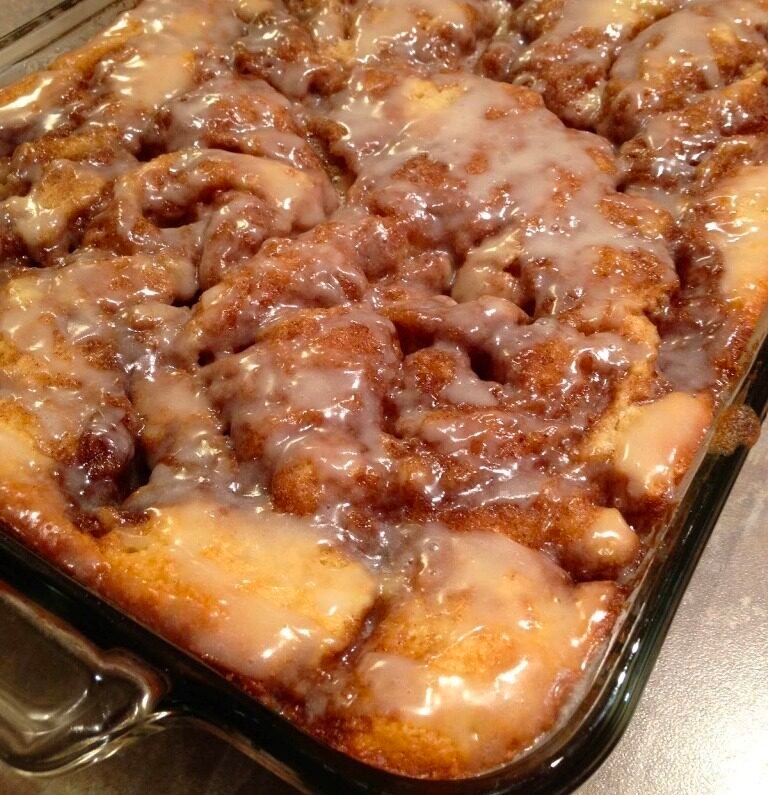Ingredients:
For the Base:
- 3 cups all-purpose flour
- 1/4 teaspoon salt
- 1 cup granulated sugar
- 4 teaspoons baking powder
- 1 1/2 cups non-dairy milk (such as almond, soy, or oat milk)
- 1/2 cup unsweetened applesauce (as an egg substitute)
- 2 teaspoons vanilla extract
- 1/2 cup vegan butter, melted (you can use plant-based margarine or coconut oil)
For the Topping:
- 1 cup vegan butter, softened
- 1 cup brown sugar
- 2 tablespoons all-purpose flour
- 1 tablespoon ground cinnamon
For the Glaze:
- 2 cups powdered sugar
- 5 tablespoons non-dairy milk
- 1 teaspoon vanilla extract
Instructions:
- Preheat the oven: Preheat your oven to 350°F (175°C). Grease a 9×13 inch baking dish.
- Prepare the Base:
- In a large mixing bowl, whisk together the flour, salt, sugar, and baking powder.
- In a separate bowl, mix together the non-dairy milk, applesauce (as an egg substitute), vanilla extract, and melted vegan butter.
- Add the wet ingredients to the dry ingredients, stirring until just combined. Be careful not to overmix.
- Pour the batter into the prepared baking dish.
- Prepare the Topping:
- In a medium bowl, combine the softened vegan butter, brown sugar, flour, and ground cinnamon. Mix until well combined.
- Drop spoonfuls of the topping mixture evenly over the cake batter.
- Swirl the Topping:
- Use a knife or spatula to swirl the topping into the batter, creating a marbled effect.
- Bake:
- Bake in the preheated oven for 25-30 minutes or until a toothpick inserted into the center comes out clean.
- Prepare the Glaze:
- While the cake is baking, prepare the glaze by whisking together the powdered sugar, non-dairy milk, and vanilla extract until smooth.
- Cool and Glaze:
- Allow the cake to cool for a few minutes before drizzling the glaze over the top.
- Serve:
- Slice and serve the vegan Cinna-bun Cake. Enjoy!
This vegan version of the Cinna-bun Cake should capture the flavors you’re looking for without using any animal products.
Gut Health:
Plant-based diets are often associated with improved gut health due to the high fiber content from fruits, vegetables, and whole grains. A healthy gut microbiome is linked to better digestion and overall well-being.
Anti-Inflammatory Properties:
Many plant-based foods have anti-inflammatory properties, which can help in reducing inflammation in the body. Chronic inflammation is associated with various health issues, and a vegan diet may contribute to its prevention.
Sports Performance:
Contrary to the misconception that vegan diets lack protein, many successful athletes follow plant-based diets to enhance their performance. Plant-based proteins can support muscle building and recovery.
Reduced Risk of Foodborne Illnesses:
Plant-based diets eliminate the risk of foodborne illnesses associated with the consumption of undercooked or contaminated animal products.
Economic Impact:
A vegan diet can be more economical as plant-based protein sources tend to be cost-effective compared to some animal products. It may be a budget-friendly option for individuals or families.
Mindful Eating:
Adopting a vegan lifestyle often promotes mindful eating. Being more conscious of food choices and sources can lead to a healthier relationship with food and a greater appreciation for the environmental impact of dietary decisions.
Preservation of Biodiversity:
The expansion of animal agriculture often leads to habitat destruction and loss of biodiversity. Choosing a vegan diet supports the preservation of ecosystems and the protection of various species.
Culinary Diversity:
Veganism introduces individuals to a diverse range of cuisines and ingredients from around the world. Exploring plant-based cooking can be a culinary adventure, embracing flavors and techniques from different cultures.
Reduced Antibiotic Resistance:
The use of antibiotics in animal farming contributes to the rise of antibiotic-resistant bacteria. Opting for a vegan diet can be a way to reduce the demand for such practices and promote responsible antibiotic use.
Cruelty-Free Beauty and Personal Care:
Veganism extends to beauty and personal care products. Choosing cruelty-free, vegan alternatives ensures that your lifestyle aligns with ethical choices beyond just dietary preferences.
